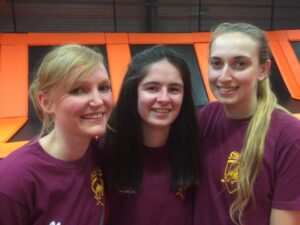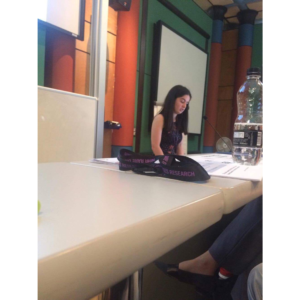Meet Katy Baker
Since before she can remember, Katy has been part of the healthcare system dealing with a congenital heart defect called Scimitar Syndrome. But what has defined her medical life has not defined Katy’s personal life. She’s a university student, on a competitive trampoline team, and rare disease activist that’s using her voice to make a positive difference.
 At 3 months old, I was diagnosed with Scimitar Syndrome, a congenital heart defect which also means I only have one functioning lung.
At 3 months old, I was diagnosed with Scimitar Syndrome, a congenital heart defect which also means I only have one functioning lung.
Since then, I have had lots of tests, consultations and been under the care of different hospitals all which I continue to go all through this today.
As I became a young adult in the hospital system, I have now moved to a different hospital, had a new consultant and had more emergency hospital visits which meant needing more tests and observations.
I first moved to a different hospital when I transitioned from pediatric to adult hospital services. I had to get used to knowing my way round a new hospital, the new tests I had to do and get to know my new doctors. And my health still correlated with my life as a young person.
When I moved to University, this meant signing up to a new general physician surgery where they did not know what my condition was, and even experience going to the emergency room in a hospital I did not know.
From my perspective, being a child or teen in pediatric medical care means that you normally have the same hospital consultant over the period of about 16 or 17 years, or whenever you transition to adult services.
In pediatrics, you are used to the same environment and over time you feel settled, not because you’re in a hospital but because it’s somewhere you’ve got to know and somewhere you know you’re going to be cared for. Being a teen in pediatric medical care is unique because you still have the support from your family and there is no pressure when it comes to whether they are there for your appointments or not. Teenagers who are chronically ill often have to grow up more quickly to understand everything that is going on but they are still children and still need support from others.
 Being a teen patient to me is different than being a child patient or an adult patient because as a teenager, you are exposed to a lot more in your life but at the same time, you are going through some other transitions which teenagers can often find difficult.
Being a teen patient to me is different than being a child patient or an adult patient because as a teenager, you are exposed to a lot more in your life but at the same time, you are going through some other transitions which teenagers can often find difficult.
However, when you’re a child, you are often more dependent on your family and they might not be aware what is going on which in a way is an advantage because as a teenager, you often have more awareness of what you are going through and your illness which can be really difficult not only for your physical but also mental health.
Having to be in hospital as a teenager can be really difficult because of everything else you are going through at the same time in your life outside of your health. But I think that one of the most important things to do is ask for support when you need. Whether the support is a family member, a friend or someone else, having support while in hospital or with a chronic illness can often be useful.
 I think teenagers in hospital would benefit from introductions and more information earlier about the transition process into adult health services. Young people often move to adult services when they are from between 14-18 years old and so new environments can seem quite overwhelming. Therefore, introductions and information about the adult services should be in place.
I think teenagers in hospital would benefit from introductions and more information earlier about the transition process into adult health services. Young people often move to adult services when they are from between 14-18 years old and so new environments can seem quite overwhelming. Therefore, introductions and information about the adult services should be in place.
Dealing with my health has been really challenging, however there have also been some benefits because it has shaped me in to who I am today. I created a film last year with a charity about how my condition does not stop me from being part of my University’s trampolining team. Since then, I was in two newspapers, on a local radio station and now being given lots of opportunities to spread my story. I was even invited to speak at a Rare Disease Day event this year, which was such a great experience.
I am also really excited to participate in the Superhero Series disability adaptive sport event this August in England as part of InvisiYouth’s Charity Friends team to show that people with disabilities or illnesses can still achieve like everyone else.
 Dealing with my health has taught me to not take life for granted and to take every opportunity that comes my way.
Dealing with my health has taught me to not take life for granted and to take every opportunity that comes my way.
In the future, I want to complete my Childhood and Youth degree, do a master’s degree and have a career working with children and young people in a hospital.
For me, it’s as if my life will be going full circle from my personal experiences and professional future.

